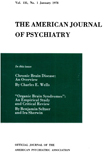Flurothyl (Indoklon) Side Effects
Abstract
The technical difficulties and obviation factors of flurothyl treatment (ICT) are discussed. Toxic delirium problems, as well as a cardiac arrest patient who recovered, are described. It is felt that flurothyl is a new somatic treatment tool in psychiatry and that its effects are different from electrically-induced convulsions.
Contrary to what is generally thought about convulsive therapy, it is felt that there is a qualitative difference between the convulsions produced by ICT and by ECT. Patients who have not responded well to ECT have responded to ICT, and the converse is true. That the effects of flurothyl are more diffuse in the brain, that cerebrospinal fluid pressures are increased more, and that MAOs apparently influence the flurothyl-treated patients with blood pressure elevation suggest appreciable differences in the resultant convulsions and perhaps explain therapeutic response.
Access content
To read the fulltext, please use one of the options below to sign in or purchase access.- Personal login
- Institutional Login
- Sign in via OpenAthens
- Register for access
-
Please login/register if you wish to pair your device and check access availability.
Not a subscriber?
PsychiatryOnline subscription options offer access to the DSM-5 library, books, journals, CME, and patient resources. This all-in-one virtual library provides psychiatrists and mental health professionals with key resources for diagnosis, treatment, research, and professional development.
Need more help? PsychiatryOnline Customer Service may be reached by emailing [email protected] or by calling 800-368-5777 (in the U.S.) or 703-907-7322 (outside the U.S.).



